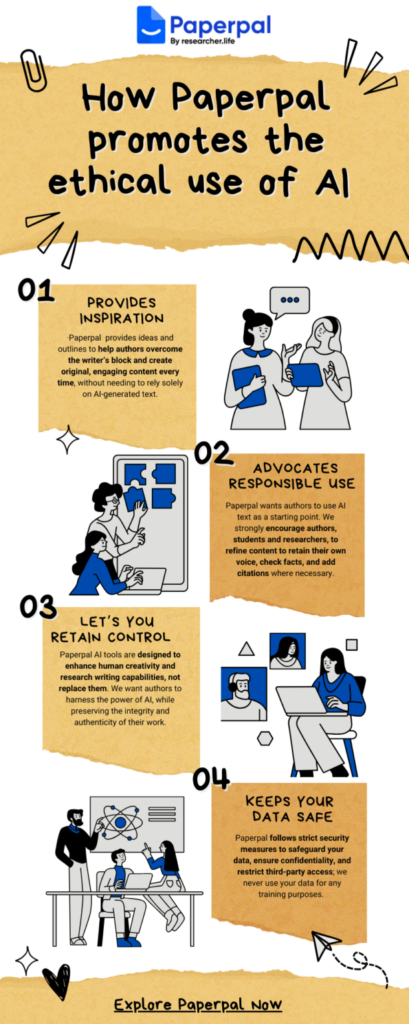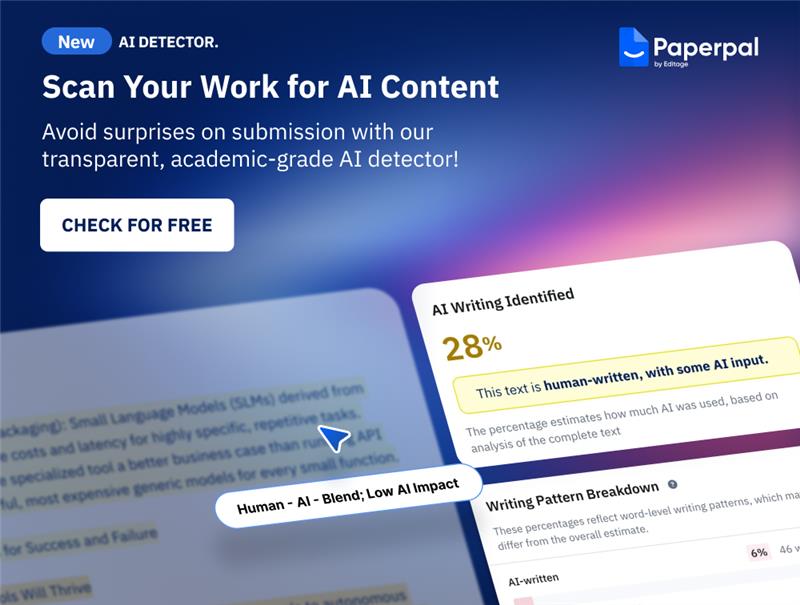Generative AI tools, such as ChatGPT, have transformed how people around the world work, including those in the academic community. With the ability to deliver coherent, human-like responses, these tools emerged as a powerful aid for authors struggling to master academic writing, especially those with English as a second language.
While generative AI holds immense potential in assisting researchers with their writing, it has also raised concerns related to AI content detection. Both students and researchers find themselves navigating a delicate balance between harnessing AI capabilities for their benefit and maintaining the highest standards of ethical research and writing.
In this article, we delve into the growing concerns surrounding AI content detection, the repercussions of relying on tools to detect AI content, and our stance on ethical AI usage in academic writing.
Growing Anxiety Around Using AI in Academia
There have been growing concerns around the ethical use of AI tools in academia, which has led to the emergence of AI content detectors. These tools help assign accountability to the author, who needs to ensure the research is original and trustworthy. The commitment to publishing original, credible, and significant research means major journals are unwilling to accept AI-generated content for publication,1 although guidelines for acceptable practices are still evolving.2
The Role of AI Content Detectors in Research Integrity
AI content detection tools are often used by institutions and academic journals to:
- Detect AI content in academic essays and manuscripts submitted for publication
- Maintain research integrity by ensuring the content is original and credible
- Assign accountability to the author, who needs to deliver
- Ensure ethical reporting about their use of AI in keeping with existing policies
However, the quest for authenticity has also brought to light a significant problem: the potential misidentification of human-authored content as AI-generated.3
The Limitations of AI Content Detection Tools
AI content detectors are far from infallible; they may falsely flag human-authored work as AI-generated or fail to detect AI content when it is indeed present. This inherent limitation raises concerns about the accuracy and reliability of AI content detection in academia.4 For instance, the US Constitution was recently flagged as AI-generated text!5 It’s important to remember that AI content detection tools are still a work-in-progress, so it’s best to use AI content detectors as a reference point in academic writing, instead of relying on them to accurately assess your work.
Paperpal: Advocating Responsible AI for Academic Writing
Paperpal advocates the ethical use of AI tools in research writing. That’s why Paperpal’s Generative AI assists and empowers human authors with outlines, suggestions, and advisory snippets rather than generating entire manuscripts, ensuring that the researcher remains in control of the writing process. This encourages students and researchers to refine, fact-check, and personalize AI-generated content, upholding the principle that academic writing must be led by the author.
 How Paperpal Endorses Ethical AI Use
How Paperpal Endorses Ethical AI Use
- Paperpal provides ideas and outlines, and combines them with real-time language and grammar checks to prevent plagiarism issues. We help authors overcome writer’s block and create original, engaging content every time without needing to rely solely on AI text.
- Paperpal takes ethical writing seriously, which is why our generative AI does not override or trick AI content detection or plagiarism checks. Authors are expected to use our AI text as a starting point, refine the content to retain their own voice, check facts, and add proper citations where necessary.
- Paperpal recognises that the true power of AI technology lies in its collaboration with human intelligence. It is designed to enhance human creativity and research writing capabilities, not replace them. We want authors to harness AI’s efficiency while preserving the integrity and authenticity of their work.
- Our proprietary large language model (LLM) has been developed in-house and trained on millions of published scholarly articles to offer reliable outcomes for your academic writing. We follow strict security measures to safeguard your data and restrict third-party access; will never use your data for any training purposes.
The concerns around AI content detection in academic writing are legitimate, and authors must remain vigilant and ensure the ethical use of AI in their work. With Paperpal, they can reap the benefits of AI while ensuring their work is original, ethical, and authentic. Embrace the future of academic writing with Paperpal, which is all set to take your research writing to the next level with Gen AI assistance.
References:
- Harker, J. Science journals set new authorship guidelines for AI-generated text. Environmental Factor, NIEHS website, March 2023. Available online at https://factor.niehs.nih.gov/2023/3/feature/2-artificial-intelligence-ethics
- Brainard, J. As scientists explore AI-written text, journals hammer out policies. Science, February 2023. Available online at https://www.science.org/content/article/scientists-explore-ai-written-text-journals-hammer-policies
- Ramlochan, S. AI Faulty Detector: The Unsettling Reality of Misidentification. Prompt Engineering Institute website, July 2023. Available online at https://www.promptengineering.org/ai-faulty-detector-the-unsettling-reality-of-misidentification/
- Coley, M. Guidance on AI Detection and Why We’re Disabling Turnitin’s AI Detector. Brightspace, Vanderbilt University website. Available online at https://www.vanderbilt.edu/brightspace/2023/08/16/guidance-on-ai-detection-and-why-were-disabling-turnitins-ai-detector/
- Edwards, B. Why AI detectors think the US Constitution was written by AI. Ars Technica, July 2023. Available online at https://arstechnica.com/information-technology/2023/07/why-ai-detectors-think-the-us-constitution-was-written-by-ai/
Paperpal is a comprehensive AI writing toolkit that helps students and researchers achieve 2x the writing in half the time. It leverages 23+ years of STM experience and insights from millions of research articles to provide in-depth academic writing, language editing, and submission readiness support to help you write better, faster. Get accurate academic translations, rewriting support, grammar checks, vocabulary suggestions, and generative AI assistance that delivers human precision at machine speed. Try for free or upgrade to Paperpal Prime starting at US$25 a month to access premium features, including consistency, plagiarism, and 30+ submission readiness checks to help you succeed. Experience the future of academic writing – Sign up to Paperpal and start writing for free!




